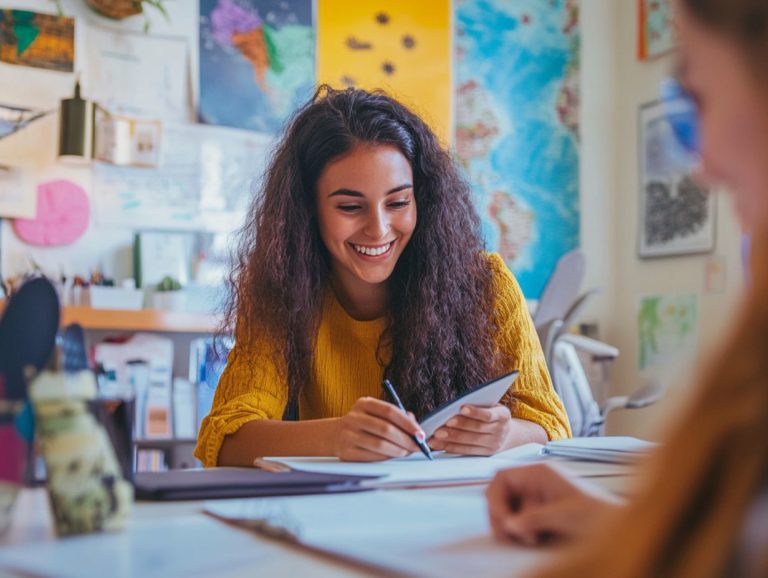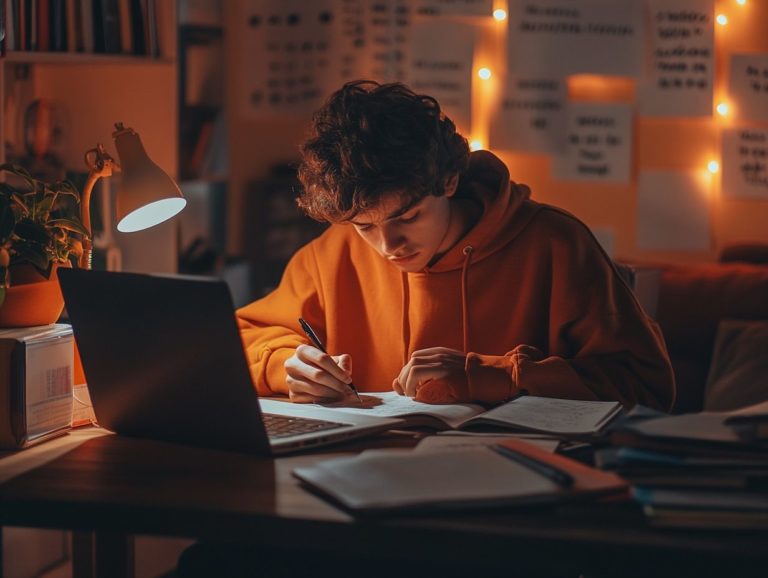Common Misconceptions About Study Abroad
Studying abroad presents an exhilarating journey, brimming with experiences that will enrich your perspective and foster personal growth.
While the allure of international education is captivating, it’s crucial to discern the realities from the myths that often accompany it.
This article delves into everything you need to know, from the significant benefits to the potential challenges you might encounter along the way.
Discover how to prepare for this transformative adventure, debunk common misconceptions, and select the program that aligns perfectly with your aspirations.
Join us as we explore the multitude of opportunities that await you!
Contents
- Key Takeaways:
- Benefits of Studying Abroad
- Common Misconceptions About Studying Abroad
- Challenges of Studying Abroad
- Preparing for a Study Abroad Experience
- Choosing the Right Study Abroad Program
- Frequently Asked Questions
- What are some common misconceptions about studying abroad?
- Is studying abroad only for wealthy students?
- Do I have to be fluent in a foreign language to study abroad?
- Can I only study abroad if I am majoring in a specific subject?
- Is it safe to study abroad?
- Do I have to study abroad for a full academic year?
Key Takeaways:

- Studying abroad provides valuable personal and professional growth opportunities.
- Many misconceptions about studying abroad are simply myths and stereotypes.
- Preparing for a study abroad experience is crucial and involves important considerations and utilizing available resources.
What is Studying Abroad?
Studying abroad presents a transformative opportunity for you to immerse yourself in a different culture while pursuing your academic goals in foreign lands. This experience improves your language skills and offers important international education that can significantly bolster your career prospects. You can seek guidance from academic advisors to navigate the complexities of your study abroad program with confidence.
This journey transcends academics; it enriches your life by exposing you to diverse perspectives and lifestyles. Engaging with local communities, savoring new cuisines, and participating in cultural events fosters your personal growth and adaptability.
You ll likely discover that overcoming challenges in unfamiliar environments sharpens your problem-solving skills and builds your resilience.
Academic advisors are instrumental in this journey, offering tailored advice and assisting you in selecting the right programs that align with your career aspirations. Ultimately, studying abroad not only broadens your educational horizons but also equips you with the skills necessary to thrive in an increasingly globalized job market.
Benefits of Studying Abroad
The benefits of studying abroad are abundant, offering you a wealth of diverse cultural experiences and the opportunity to forge friendships with individuals from across the globe.
You can explore various scholarship opportunities and financial aid options designed to ease the financial burden, all while enriching your academic journey through an international education.
Personal and Professional Growth
Studying abroad truly fosters both personal and professional growth, equipping you with essential language skills and enhancing your career opportunities. Engaging in extracurricular activities and interacting with international students broadens your perspectives, preparing you for a globalized workforce.
These enriching experiences encourage adaptability and problem-solving traits that are crucial in today s fast-paced job market. By immersing yourself in different cultural settings, you gain valuable insights into global issues and develop critical thinking and emotional intelligence.
Networking with peers from diverse backgrounds can open doors to unique internships and job prospects, while the language proficiency you acquire through daily interactions becomes a significant asset. This experience will help you tackle challenges head-on with confidence, ultimately shaping you into a well-rounded professional ready to thrive in any environment.
Common Misconceptions About Studying Abroad

Studying abroad offers a wealth of advantages, yet it is often clouded by a series of misconceptions. To help clear things up, you can explore the most common study abroad questions that may discourage you from embracing this enriching experience.
You might find yourself worried about safety, the availability of financial aid, or the notion that scholarships are reserved solely for a select few.
These myths can easily take root, but it’s essential to recognize and dispel them to fully appreciate the opportunities that studying abroad presents, including understanding the most frequent study abroad mistakes.
Ready to explore the world? Start planning your study abroad adventure today!
Debunking Myths and Stereotypes
Don’t miss out! There are many financial aid and scholarship opportunities waiting for you! How to overcome stereotypes while studying abroad is essential for encouraging you to embrace this transformative experience, especially given the uncertainties created by situations like COVID-19.
You might think that financial aid and scholarship opportunities are scarce. The truth is, there are plenty of resources available to support you financially.
Numerous scholarship programs, including those offered by universities and private organizations, specifically cater to international students like yourself. These programs not only aim to alleviate your financial burden but also promote global education.
Compelling testimonials from successful international students highlight the opportunities that come from securing such financial aid. Research these invaluable resources to empower your journey! Connect with advisors and participate in online forums. By doing so, you can navigate the landscape of financial assistance more effectively, ensuring that misconceptions don t stand in the way of your educational aspirations.
Challenges of Studying Abroad
Studying abroad offers a wealth of advantages, but it also brings a unique set of challenges, such as navigating cultural adjustments and grappling with homesickness. These experiences are common among many students.
To truly enhance this journey, ensure there is strong support for students through resources like efficient housing options and comprehensive safety measures. By addressing these concerns, you can significantly enhance your experience and pave the way for success during your time overseas.
Cultural Adjustments and Homesickness
Cultural adjustments getting used to new customs and ways of life and homesickness are significant hurdles you often face during your study abroad experience. Seek strong support systems that can help you adapt and enjoy your time abroad!
Navigating these emotional challenges can indeed be daunting. You may find yourself grappling with feelings of isolation and confusion as you strive to integrate into a foreign culture.
The discomfort of being in an unfamiliar setting can lead to anxiety and a longing for the comforts of home, which is completely natural. To combat these feelings, consider engaging in local community activities or connecting with fellow international peers who are facing similar struggles.
Building relationships through student organizations and support groups can provide a robust safety net, fostering a sense of belonging and understanding. Regular communication with friends and family back home can help alleviate loneliness and reinforce your identity during this transformative journey.
Preparing for a Study Abroad Experience

Preparing for a study abroad experience requires careful thought and strategic planning to ensure a seamless transition. You’ll want to delve into available student resources and consider enrolling in online courses.
By doing so, you can expertly navigate your academic journey, ensuring you graduate on time while fully capitalizing on the enriching opportunities that come with an international education.
Start your application for scholarships today!
Important Considerations and Tips
When you prepare for a study abroad experience, several key considerations come into play. Selecting the right student housing, exploring money help for students, and making the most of available student resources are essential.
Implement these strategies to enhance your experience. Maximize your time abroad effectively.
To start, research local accommodations that fit your budget. Websites like HousingAnywhere or Uniplaces provide various options, from shared flats to university dormitories. This makes finding the perfect fit easier.
Don’t overlook scholarships specifically geared toward international studies. Opportunities like the Gilman Scholarship or the Fulbright Program can help ease your financial burdens.
Use your university’s support systems for valuable resources. Services like counseling, language exchange programs, and orientation sessions can help you acclimate to your new surroundings.
By understanding these essential elements, you can position yourself for a successful and enriching international experience.
Choosing the Right Study Abroad Program
Selecting the ideal study abroad program is a pivotal choice. This decision significantly influences your academic and personal journey. Consider several key factors, such as your major courses and the option for online programs.
A program that aligns with your goals opens the door to enriching cultural experiences and enhances your academic accomplishments.
Factors to Consider and Resources to Use
When evaluating study abroad programs, consider factors that can elevate your experience. Look into available student resources, financial aid options, and potential scholarship opportunities.
A thorough understanding of these elements enhances both your experience and academic success while abroad.
Beyond these considerations, the reputation of the host institution, the curriculum offered, and the opportunities for cultural immersion can shape your journey. Assessing the safety of your destination and potential language barriers will ensure a smooth transition during your stay.
Utilize resources like the EducationUSA network and various online scholarship databases. Engaging with forums and social media groups dedicated to study abroad provides tips and firsthand experiences from peers. This creates a robust support network for your upcoming adventure.
Frequently Asked Questions

What are some common misconceptions about studying abroad?
Some misconceptions include the belief that studying abroad is only for wealthy students, only for certain majors, or only for a full academic year, as highlighted in top myths about studying abroad.
Is studying abroad only for wealthy students?
No, many affordable options are available. Financial aid and scholarships are accessible for students who qualify.
Do I have to be fluent in a foreign language to study abroad?
No, many programs offer courses in English or have language courses for beginners.
Can I only study abroad if I am majoring in a specific subject?
No, programs exist for various majors. Studying abroad can be a great chance to explore different subjects.
Is it safe to study abroad?
Yes, studying abroad can be safe and rewarding. Research safety measures and support services provided by your program. Follow safety guidelines while abroad.
Do I have to study abroad for a full academic year?
No, short-term options like summer or semester programs are available for students who may not commit to a full year abroad.






